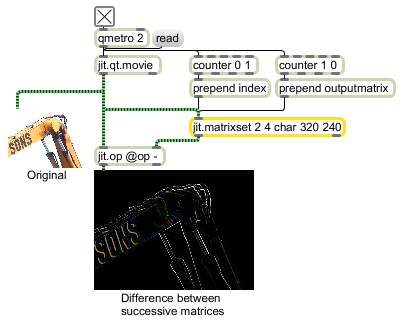Examples

A set of matrices for storage/resequencing
| bang | Equivalent to . | |
| clear | Sets all values to zero. | |
| exportmovie |
filename [symbol] FPS [float] codec [symbol] quality [symbol] timescale [int] |
Exports a matrix as a QuickTime movie. The message takes an optional argument to specify a file name. If no filename is specified, a file dialog will open to let you choose a file. The default FPS is 30. frames per second The default codec is raw . Supported codecs are raw , cinepak , graphics , animation , video , componentvideo , jpeg , mjpega , mjpegb , sgi , planarrgb , macpaint , gif , photocd , qdgx , avrjpeg , opendmljpeg , bmp , winraw , vector , qd , h261 , h263 , dvntsc , dvpal , dvprontsc , dvpropal , flc , targa , png , tiff , componentvideosigned , componentvideounsigned , cmyk , microsoft , sorenson , indeo4 , argb64 , rgb48 , alphagrey32 , grey16 , mpegyuv420 , yuv420 , and sorensonyuv9 . The default quality is max . Supported quality settings are lossless , max , min , low , normal , and high . Note that minimum quality is, in many cases, the codec's default quality. Use "low" quality for consistent results. The default timescale is 600 units per second |
| importmovie |
filename [symbol] time-offset [int] index-ffset [int] number-of-frames [int] |
Imports a QuickTime movie into the matrix set. If no filename is specified, a file dialog will open to let you choose a file. The time-offset and index-offset arguments may be used to set a time and index offset for the QuickTime movie being imported (the default is 0 for both arguments). The number-of-frames argument specifies the number of frames to import (the default is set to the value specified by the matrixcount attribute). Note that the importmovie message will not resize the jit.matrixset. |
| read | filename [symbol] |
Reads Jitter binary data files (.jxf) into a matrix set. If no filename is specified, a file dialog will open to let you choose a file. |
| write | filename [symbol] |
Writes matrix set as a Jitter binary data file (.jxf). If no filename is specified, a file dialog will open to let you choose a file. |
| Name | Type | g/s | Description |
|---|---|---|---|
| index | int | The which of the matrices an incoming matrix will be written to (default = 0) | |
| matrixcount | int | The number of matrices in the matrix set (default = 1) | |
| planecount | int | The number of planes in matrix data (default = 4) | |
| type | symbol | The type of matrix data (default = ) Supported data types are , , , or . | |
| dim | int | The dimensions of matrix data (default = 1 1) | |
| planemap | int | Maps input planes to output planes (default = 0 1 2 3 ...) | |
| srcdimstart | int | The source dimension start position (default = all 0) | |
| srcdimend | int | The source dimension end position (default = all dim values minus 1) | |
| dstdimstart | int | The source dimension start position (default = all 0) | |
| dstdimend | int | The destination dimension end position (default = all dim values minus 1) | |
| thru | int | Thru mode flag (default = 1) When the flag is set, a matrix is output when another one is received. | |
| interp | int | Interpolation flag (default = 0) When the flag is set, an input matrix is interpolated when copied to internal matrices. | |
| usesrcdim | int | Srcdim use flag (default = 0) When the flag is set, the source dimension's attributes are used when copying an input matrix to an internal matrix. | |
| usedstdim | int | Destdim use flag (default = 0) When the flag is set, the destination dimension's attributes are used when copying an input matrix to an internal matrix. |

| Name | Description |
|---|---|
| jit.matrix | The Jitter Matrix! |
| Tutorial 20: Importing and Exporting Single Matrices | Tutorial 20: Importing and Exporting Single Matrices |